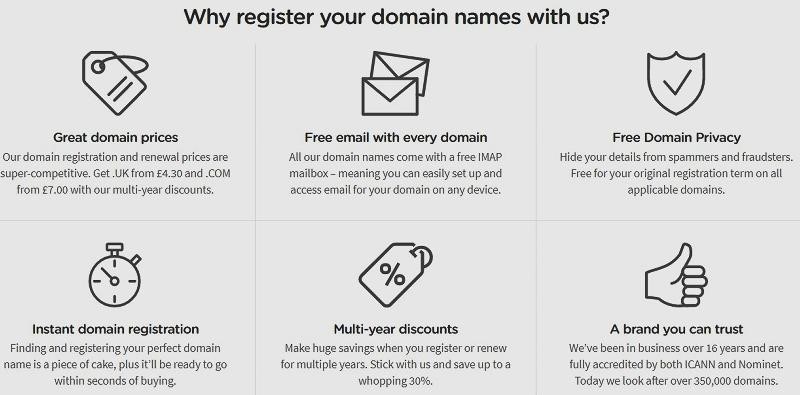Finding a UK Domain Name that Does it All

Your domain name is an essential consideration when you are choosing your business name. The two have to match, so customers know where to go.
It ain’t easy. Domain “investors” have bought so many one and two-word combos that there are few left for those with a genuine need.
Don’t Let a Thief Steal Your Domain Name
Searching for domain names is a problem in itself. Some domain sites sell your search information to people who then buy the domain you want in the hope of blackmailing you into paying £200 instead of the £10 it would have initially cost.
This practice is legal, but domain sitters and people who buy domain name searches are universally loathed even if they are not criminals.
You have two options:
- Buy the domain name the first time you search – The thieves don’t get a chance to get it before you.
- Buy from a reputable domain name reseller – Good companies pledge to keep your search data secure and never sell it
Finding a Reputable Domain Name Seller
It is best to buy domain names from a UK company because it means you never have currency conversions to deal with and you have support staff you can understand if you ever need to talk to them.
If you buy a domain name separately from your hosting account, you may find freebies such as free domain privacy which make the deal even more attractive.
The screenshot above is from LCN, a British company that promises privacy of your search data.
Hosting companies usually include a free domain name/URL for 12 months when you take out a hosting contract. Don’t use this free URL for your business because hosting companies come and go, as this article on The BusinessDesk.com demonstrates, and this could complicate things when you come to renew your domain.
What Domain Name Do You Need?
The perfect domain name/URL:
- Matches your business name perfectly
- Is a .com URL
- Is not in the dictionary so that you can use it as a trademark, eg Google, Facebook, Instagram
- Is short
- Is easy to pronounce
- Is easy to spell
- Includes some reference to your trade
- Will be attractive to anyone who buys your business
- Contains no numbers
- Contains no hyphens (-) or underscore (_) characters
You are not going to find ‘perfect’, so you need to decide from this wishlist the URL features that are essential. If you search from a trustworthy seller, then you will be able to draw up a shortlist of possibilities and consider them at length.
1. Matches your business name perfectly
If you have already registered a business name and started trading, an exact match might not be possible. If you are trading as, eg, Bert Smith Motors and your business name is Bertinstein.Ltd then you should find a URL as close to Bert Smith Motors as you can find because this is the name your customers will know you as. Importance 10/10)
2. Is a .com URL
Despite all the hype about alternative domain suffixes, .com still reigns supreme in customers’ minds, which is where it matters. The only alternative for a British business is a co.uk URL. There are new UK domain suffixes (.uk or .com.uk), but your customers are not familiar with them, so they are best avoided. (Importance 10/10)
3. Is not in the dictionary so that you can use it as a trademark, eg Google, Facebook, Instagram
If all the good words are taken, create your own like timbrr.co.uk, or mewzikk.com (Both available at the time of writing (Jan 2018).
Inventing a new word has the advantage that you can attempt to trademark your URL. Apple can never trademark ‘Apple’, but the company can trademark ‘iPhone’. (Importance 8/10)
4. Is short
Short means easy to remember, but every 4-letter combo has been taken, so your only chance of a very short domain is to be creative with your spelling and to come up with a new word. (Importance 6/10)
5. Is easy to pronounce
Many people remember a URL better if they can hear it, so pronunciation is vital. Print out your preferred domain name and ask a few trusted friends how they would pronounce it because what you think is obvious, might not be to others. (Importance 10/10)
6. Is easy to spell
If you have a word that is in this list of common misspellings, you should rethink. Avoid triple letters like MissSpelling.com or AppPlace.com because people will struggle to type them out correctly. (Importance 9/10)
7. Includes some reference to your trade
BertSmith.com tells anyone who searches for used vans nothing. A much better domain name would be BertSmithUsedVans.com. This might also rank higher in search engines because the URL contains the keyword phrase people searched for. (Importance 8/10)
8. Contains no numbers
If your preferred URL were BertSmith1.com, people would have to say “BertSmith?. NUMBER 1”. It is amateurish, and nobody will share your web address because it sounds such a mouthful. (Importance 10/10)
9. Contains no hyphens (-) or underscore (_) characters
If you need underscores or hyphens it’s because someone else has the original (and best) domain name; it shows you are not the first to come up with that domain. If there are two Bert Smith Motors sites, which would you click on, Bert_Smith_Motors.com or BertSmithMotors.com? (Importance 10/10)
10. Will be attractive to anyone who buys your business
If your business exit plan includes selling it on when you want to retire, then you must consider the URL’s attractiveness to buyers.
If your name is Bert Ploncker, you are one seriously unlucky guy and should either change your name or use something else as your business name. Nobody will buy a business with a site called Bert Ploncker Motors. (Importance 9/10)
In Brief
Search on a reputable site for multiple .com or .co.uk domain names that meet all the 10/10 criteria given here.







